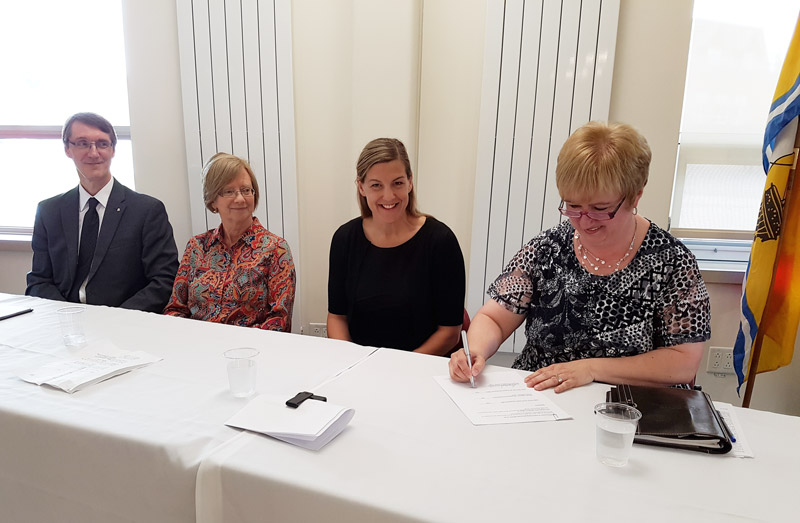UNB, UdeM, NBCC and CCNB announce Civil Engineering MOU

FREDERICTON – The University of New Brunswick, the Université de Moncton, The New Brunswick Community College and the Collége communautaire de Nouveau-Brunswick, are pleased to announce an engineering memorandum of understanding (MOU) which will allow for enhanced credit transfer between the four New Brunswick post-secondary education institutes.
The collaboration will create more pathways for students in the field of civil engineering. It will provide further opportunities for educational experiences for post-secondary students, while not repeating relevant learning.
This agreement is the first of its kind in the province.
This endeavour is supported by the Council on Articulations and Transfer of New Brunswick (CATNB), of which all four institutions are members. The organization was founded in 2010 as a participatory council of the department of Post-Secondary Education, Training and Labour, with a mandate to work collaboratively among participating institutions at enhancing credit transfer and foster awareness of Prior Learning assessment and Recognition (PLAR). NBSCETT/SttagN-B is a founding member, of the NB-PLAR Task Force.
“Agreements such as this one help improve access to post-secondary education in the province, as well as respond to the needs of the labour market,” said André Samson, vice-president academic research at the Université de Moncton.
“This agreement opens the door for further accessibility to post-secondary education in New Brunswick. Our university values strong partnerships with our fellow educational institutions and by signing this memorandum of understanding, we can continue to grow educational and work opportunities in the province,” said Jane Fritz, interim vice president academic at the University of New Brunswick.
“We recognize that our learners come to NBCC from a cariety of backgrounds and aspirations. By collaborating with partners like UNB, UdeM, and the CCNB, we can create new pathways to and from our institutions to help students achieve success.” said Mary Butler, vice president of academic development at the NBCC.
“One of our priorities is to offer flexible programming and increase accessibility to post-secondary education, which is why the CCNB is very pleased with the signing of this agreement. It is great news for our students who want to pursue studies to obtain a civil engineering degree.” commented CCNB vice president academic and student development, Brigitte Arsenault.
“Congratulations to the Council of Articulations and Transfer of New Brunswick (CATNB) on the success of collaborating with four New Brunswick institutions to enhance student mobility in the field of Civil Engineering and on the commitment to work toward formal transfer agreements in other engineering disciplines. The initiative to improve articulations and transfers support the government’s key priority of job creation to grow the economy in New Brunswick.” said Post-Secondary Education, Training asnd Labour Minister Francine Landry.
